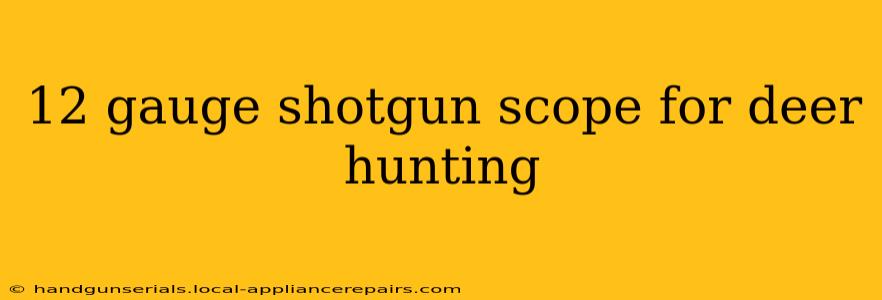Choosing the right scope for your 12-gauge shotgun can significantly impact your deer hunting success. While many hunters traditionally rely on iron sights, a scope offers several advantages, particularly for longer shots or in low-light conditions. This guide explores the crucial factors to consider when selecting a 12-gauge shotgun scope for deer hunting, ensuring you make an informed decision to enhance your hunting experience.
Understanding the Unique Challenges of Scoping a Shotgun
Before diving into specific scope recommendations, it's essential to understand the differences between scoping a shotgun versus a rifle. Shotguns, especially 12-gauges, produce significant recoil. This recoil can negatively affect zero retention and even damage a poorly constructed scope. Furthermore, the spread pattern of shotgun shells necessitates a different approach to aiming and sighting compared to the pinpoint accuracy of a rifle.
Key Factors to Consider When Choosing a Scope
Several crucial factors determine the suitability of a shotgun scope for deer hunting:
1. Recoil Resistance:
This is paramount. Look for scopes specifically designed for high-recoil applications. Features like robust construction, reinforced tubes, and shock-absorbing mechanisms are critical to ensuring the scope's longevity and accuracy. Look for scopes explicitly marketed as "shotgun scopes" or those with high recoil ratings.
2. Magnification:
For deer hunting with a 12-gauge shotgun, a low-to-moderate magnification range is usually sufficient. A variable magnification scope, allowing you to adjust magnification based on distance and lighting conditions, is often preferred. A range of 1-4x or 2-7x provides excellent versatility. High magnification scopes are generally unnecessary and can be cumbersome for shotgun hunting.
3. Tubing Diameter:
Larger diameter tubing (like 30mm or 34mm) generally offers better light transmission and more robust construction, which is beneficial for withstanding recoil. However, they are also heavier and bulkier. 30mm is a good compromise between performance and weight.
4. Lens Quality:
High-quality lenses are vital for clear, crisp images, especially in low-light conditions. Look for scopes with fully multi-coated lenses to enhance light transmission and reduce glare.
5. Reticle Choice:
The reticle (the aiming point in the scope) should be simple and easy to use, especially under pressure. A simple duplex reticle or a dot reticle are popular choices for shotgun hunting. Avoid overly complex reticles that can hinder quick target acquisition.
6. Mounting System:
Ensure the scope mounts are specifically designed for shotguns and are securely attached. The right mounting system will minimize the risk of shifting or damage due to recoil.
7. Eye Relief:
Adequate eye relief is essential to prevent eye injury from recoil. Ensure the scope provides sufficient eye relief to comfortably position your eye behind the scope without fear of impacting your face with the eyepiece.
Scope Recommendations (General Categories - Specific Models Change Frequently)
While I cannot recommend specific brands or models (as product availability and features constantly change), I can highlight categories to guide your search:
-
Budget-Friendly Options: Several manufacturers offer affordable scopes suitable for 12-gauge shotguns. These often prioritize durability over advanced features. However, always prioritize recoil resistance.
-
Mid-Range Options: These offer a balance of features and durability, typically with better lens quality and more robust construction.
-
High-End Options: These scopes usually feature premium lens coatings, enhanced durability, and advanced features like illuminated reticles, but come at a higher price point.
Beyond the Scope: Important Considerations
-
Ammunition Choice: The type of ammunition you use (slugs, buckshot) will influence your sighting and accuracy. Ensure you zero your scope with the specific ammunition you intend to hunt with.
-
Practice and Zeroing: Proper zeroing is crucial for accuracy. Spend ample time at the range practicing with your scoped shotgun to get comfortable with your setup.
-
Safety: Always prioritize safety when handling firearms. Practice safe gun handling techniques and follow all relevant hunting regulations.
Choosing the right 12-gauge shotgun scope for deer hunting involves careful consideration of several factors. By understanding the specific challenges of scoping a shotgun and selecting a scope that meets your needs and budget, you can significantly improve your hunting accuracy and success rate. Remember to always practice responsible gun handling and hunting ethics.

